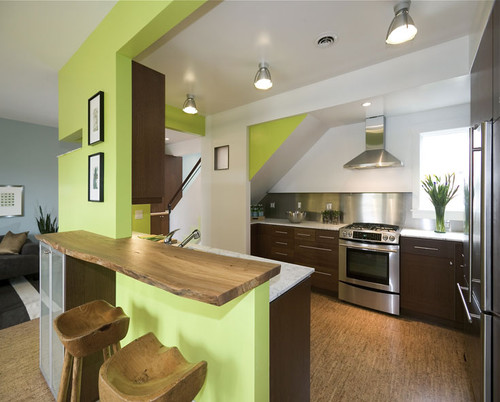7 Kitchen Flooring Materials to Boost Your Cooking Comfort
 Friday, September 13, 2013 at 10:20AM
Friday, September 13, 2013 at 10:20AM Article By: Jennifer Ott
I love the look of polished concrete floors in kitchens, but concrete — along with other nonresilient floor surfaces, such as stone, ceramic and porcelain tile — can take a toll on your joints. I've heard complaints from many homeowners who regret putting in a hard flooring material in their kitchen because of the subsequent knee, hip or back pain they feel after standing or walking on it for a long period. Fortunately there are plenty of softer, resilient kitchen flooring types available that are as functional as they are good-looking.
Sustainably harvested from the bark of the cork oak tree, cork is an excellent resilient floor choice in a kitchen due to its high level of cushioning. It's available in a variety of colors, patterns and textures, and in tile or plank formats. It is somewhat self-healing but can get scratched and dented. You can mitigate this by regularly applying a protective layer of wax or polyurethane and by using protective felt pads on the feet of your furniture.
Material cost: $4 to $14 per square foot
Not to be confused with vinyl flooring, linoleum is made from all-natural and renewable materials such as linseed oil, pine rosin and powdered cork. It's soft underfoot yet quite durable, and it comes in a wide range of colors and patterns. As with cork, applying and maintaining a protective finish will keep it looking good for many years.
Material cost: $5 to $10 per square foot
This is a bit of an unusual choice in a residential kitchen, but rubber flooring is becoming more common in homes. Soft, springy and durable, it is a terrific choice if you want to stand for hours in your kitchen without bringing on the aches and pains. Rubber flooring is available in tile and sheet formats, and should be sealed after installation and again every year or two, depending on traffic and wear.
Material cost: $6 to $12 per square foot
A popular budget-friendly option, vinyl flooring comes in both sheet and tile formats and in an endless array of styles and colors. I like to have fun with vinyl; I like to use bolder colors or lay it out in an interesting pattern. However, it's not as durable as other resilient flooring options and can get dinged up pretty easily. Therefore, it tends to have a shorter life span than other options.
Material cost: $2 to $10 per square foot
A favorite flooring material for kitchens, wood is more forgiving on our joints than stone, ceramic, porcelain or concrete. It also looks and feels warmer than nonresilient flooring. Some drawbacks to wood are that it can get scratched and dinged easily, and it also must be protected from contact with water. In kitchens I recommend going with a site-finished wood floor rather than a prefinished floor. Yes, it's a messy business sealing the floor after installation, but by sealing it after installation you also seal up the joints, preventing water and dirt from collecting in them.
Material cost: $5 to $20 per square foot
Not technically wood — it's actually a grass — bamboo has many of the same advantages and disadvantages as wood. It's a good option if you are looking to use a sustainably harvested material for your kitchen floor. Not all bamboo flooring is the same, however; be sure to look for moso bamboo, as it's considered the hardest and most durable.
Material cost: $5 to $12 per square foot
Similar to vinyl flooring products, laminates are a budget-friendly flooring choice and are soft underfoot when compared to rigid flooring materials. They tend to be more moisture resistant than wood floors, but because they are not a solid material all the way through, they can't be refinished if damaged.
Material cost: $2 to $5 per square foot
For those who simply must have their hard tile or concrete kitchen floor, there's always the option of placing gel mats or other cushioning rugs in areas of your kitchen where you spend large amounts of time standing, such as at your sink or in front of the range.
 Bamboo Flooring,
Bamboo Flooring,  Kitchen,
Kitchen,  Laminate Flooring,
Laminate Flooring,  cork in
cork in  Flooring,
Flooring,  Kitchen
Kitchen 
























Reader Comments